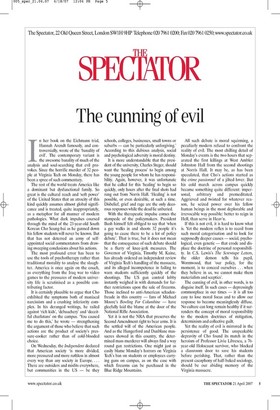The cunning of evil
In her book on the Eichmann trial, Hannah Arendt famously, and controversially, wrote of the ‘banality of evil’. The contemporary variant is the awesome banality of much of the analysis and soul-searching that evil provokes. Since the horrific murder of 32 people at Virginia Tech on Monday, there has been a spree of such commentary.
The rest of the world treats America like a dominant but dysfunctional family. So great is the cultural reach and ‘soft power’ of the United States that an atrocity of this kind quickly assumes almost global significance and is treated, quite inappropriately, as a metaphor for all manner of modern pathologies. What dark impulses coursed through the mind of the 23-year-old South Korean Cho Seung-hui as he gunned down his fellow students will never be known. But that has not deterred an army of selfappointed social commentators from drawing sweeping conclusions about his actions.
The most profound error has been to use the tools of psychotherapy rather than traditional morality to analyse the slaughter. America is once again on the couch, as everything from the Iraq war to video games to the pressures of modern university life is scrutinised as a possible contributing factor.
It is certainly plausible to argue that Cho exhibited the symptoms both of maniacal narcissism and a crushing inferiority complex. In his deranged writings, he railed against ‘rich kids’, ‘debauchery’ and ‘deceitful charlatans’ on the campus. ‘You caused me to do this,’ he wrote — strengthening the argument of those who believe that such actions are the product of society’s pressure-cooker rather than of cold-blooded choice.
On Wednesday, the Independent declared that American society ‘is more divided, more pressured and more ruthless in almost every way than any society in Europe.... There are outsiders and misfits everywhere, but communities in the US — be they schools, colleges, businesses, small towns or suburbs — can be particularly unforgiving.’ According to this dubious analysis, social and psychological adversity is moral destiny.
It is more understandable that the president of the university, Charles Steger, should want the ‘healing process’ to begin among the young people for whom he has responsibility. Again, however, it was unfortunate that he called for this ‘healing’ to begin so quickly, only hours after the final shots had rung out from Norris Hall. ‘Healing’ is not possible, or even desirable, at such a time. Disbelief, grief and rage are the only decorous responses while the dead lie unburied.
With the therapeutic impulse comes the stampede of the policymakers. President Bush himself felt obliged to say that ‘when a guy walks in and shoots 32 people it’s going to cause there to be a lot of policy debate’. That is true, but it does not mean that the consequence of such debate should be a flurry of knee-jerk measures. The Governor of Virginia, Timothy M. Kaine, has already ordered an independent review of Virginia Tech’s handling of the massacre, and its alleged incompetence in failing to warn students sufficiently quickly of the shootings. The US gun control lobby instantly weighed in with demands for further restrictions upon the sale of firearms. Those inclined to anti-American schadenfreude in this country — fans of Michael Moore’s Bowling For Columbine — have gleefully laid the blame at the door of the National Rifle Association.
Yet it is not the NRA that preserves the Second Amendment right to bear arms. It is the settled will of the American people. And as the Hungerford and Dunblane massacres showed in this country, the determined mass murderer will always find a way round gun restrictions. One might just as easily blame Monday’s horrors on Virginia Tech’s ban on students or employees carrying guns on campus, as on the ease with which firearms can be purchased in the Blue Ridge Mountains. All such debate is moral squirming, a peculiarly modern refusal to confront the reality of evil. The most chilling detail of Monday’s events is the two hours that separated the first killings at West Ambler Johnston Hall from the second shootings at Norris Hall. It may be, as has been speculated, that Cho’s actions started as the crime passionnel of a jilted lover. But his cold march across campus quickly became something quite different: impersonal, arbitrary and premeditated. Aggrieved and twisted for whatever reason, he seized power over his fellow human beings in the most deplorable and irrevocable way possible: better to reign in Hell, than serve in Heav’n.
If this is not evil, it is hard to know what is. Yet the modern reflex is to recoil from such moral categorisation and to look for supposedly deeper causes — social, psychological, even genetic — that erode and displace the doctrine of personal responsibility. In C.S. Lewis’s The Screwtape Letters, the older demon tells his pupil, Wormwood, that ‘our policy, for the moment, is to conceal ourselves ... when they believe in us, we cannot make them materialists and sceptics’.
The cunning of evil, in other words, is to disguise itself. In such cases — depressingly commonplace in our times — it is all too easy to lose moral focus and to allow our response to become meaninglessly diffuse. No culture can long remain healthy if it surrenders the concept of moral responsibility to the modern doctrines of mitigation, determinism and collective guilt.
Yet the reality of evil is mirrored in the persistence of good. The unspeakable depravity of Cho found its match in the heroism of Professor Liviu Librescu, a 76year-old Holocaust survivor, who blocked a classroom door to save his students before perishing. That, rather than the present cacophony of half-baked sociology, should be our abiding memory of the Virginia massacre.


















































































 Previous page
Previous page